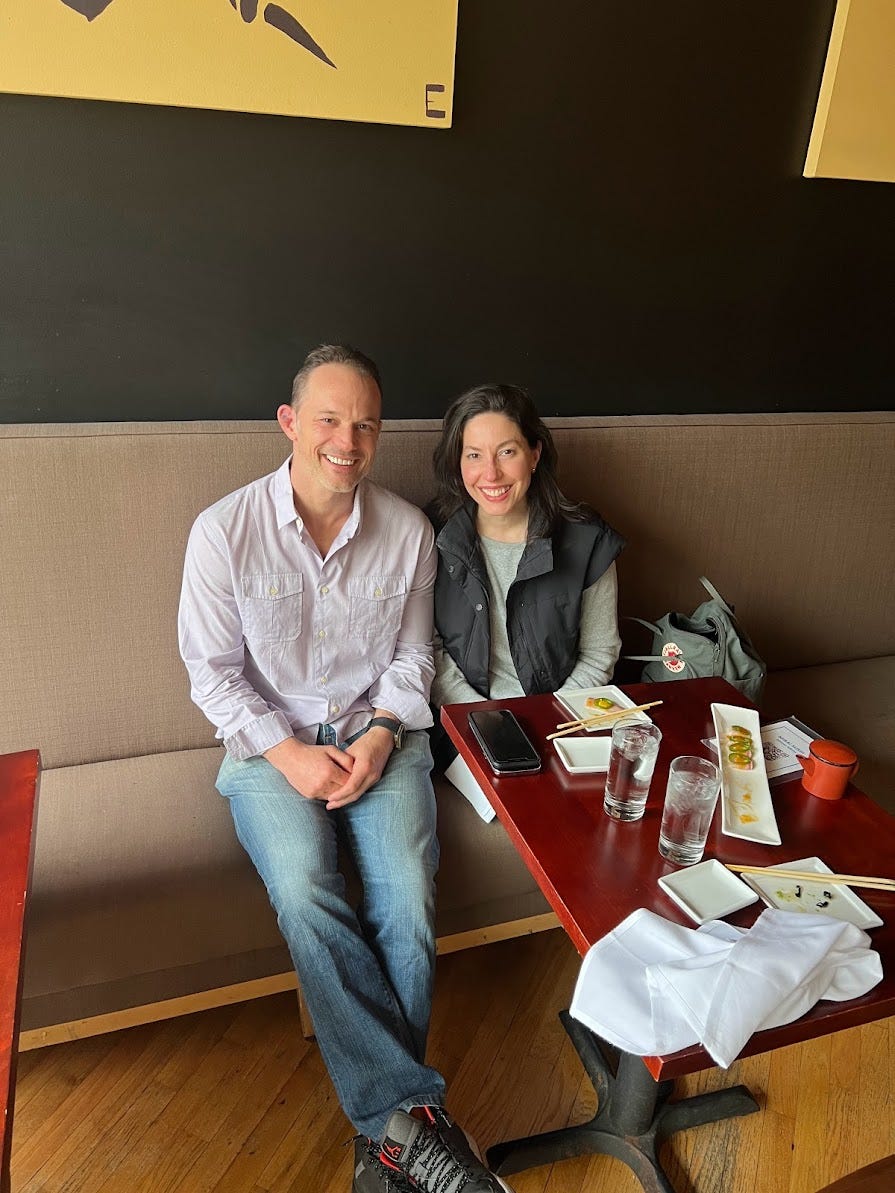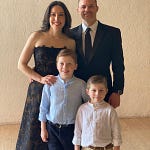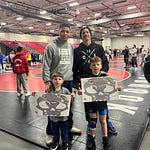🔥Welcome to Volume #00085!🔥
I’m Christian Champ. This is ☯️The Middle Way Newsletter ☯️. It is a place where I write, explore, share, and invite you along for the journey.
If you enjoy the newsletter, please share it with your friends.
🧱How Can We Use the Beautiful Power of Constraints? 🧱
"The thing is, if you've ever tried to play hockey on a rink that has no boards, that's just a giant lake, two totally different games. The boards are the point. Without the boards, there is no hockey. And for me, I've set up constraints all around me. Constraints about how I choose, which projects, constraints about what I eat, constraints about what a project can entail and what it can't entail. Constraints about how many people work with me, constraints about which media I'm going to be in and which ones I'm not going to be in. And they're all arbitrary." - Seth Godin
After tumbling class on Saturday, my kids and their classmates tore through the gym.
Little people play vacillates between chaos and order.
Pushing, fighting, and even status games break out. Kids, like us adults, want to be in charge, want what the other kids have, and want to feel included.
Enter the Beautiful Power of Constraints
This Saturday was different, the kids quickly self-organized into a game.
They raced back and forth from end to end, doing various "challenges."
A kid called out, "bear crawls," and everyone immediately did bear crawls down and back. Another kid called out "backwards," and everyone ran backwards down and back.
The constraints of the game brought order and allowed everyone to play, get along and practice various movements.
Everyone focused on the task at hand instead of slamming into each other, fighting over the trampoline, or tackling whoever held the juggling balls.
In a world of distractions, we can use constraints to help us focus and level up our skills.
Here are four ways we can use constraints:
1/ Act As a Forcing Function for Focus and Finding Our DEEPER YES
We start with the simple question, "Is this something worth spending time on"?
We can get to our DEEPER YES when we do this and know where to draw lines and where to focus. If we want more focused effort, we need to figure out the actions around it and then block out time.
We put up the constraints. We create a structure to force our focus and drive our outcomes.
2/ Create Movement and Make Choices
A constraint moves us forward because it takes out options. We don't need to think about the start of what we are doing because we have already decided.
Once we choose, we open up space.
Our choices restrict space to create space. The choice being made means that we can start right away.
It’s like deciding what we want to learn. If we want to learn to play the drums, we need a drum, a time to practice, and a plan of practice.
We don’t need to continue to debate which instrument.
Once we make that decision, it is off we go.
Objects in motion stay in motion.
We want to get in shape, so we train on these days full stop.
We want to be more present with our family, so we ditch our screens and spend time being active with our family these days at this time.
We want to get better at thinking, so we read and write for one hour every day before bed.
Brian Eno wrote about taking the one journey in his journal while working with David Bowie.
More and more, I find I work better with quite strict structures around me. What I was doing last week in those early mornings was working up some new material for these Bowie sessions. I only had a few days - and the effect of this is to focus attention. Less exploring of all the possible journeys you could make; more determination to take one journey (even if the choice of it is initially rather arbitrary) and make it take you somewhere. The big surprise for me when I work like that is discovering myself capable of an almost 'automatic writing' way of working. I cease to evaluate much, instead just letting something carry me along. Listening back later, I think, 'How on earth did I get an idea like that?
3/ Create Repetition
The easiest way to improve and level up ANYTHING is by repetition.
When we force ourselves to do something repeatedly, we increase the odds of getting our 10,000 hours. We increase the odds of mastering the patterns and understanding them more deeply.
We become Tiger Woods practicing his swing, Steph Curry shooting threes, or Terry Gross mastering the questions for an interview.
We start out doing "small circles," as Josh Waitzkin writes about in his book The Art of the Learn. We start with the micro and add it together to create the macro.
As Bruce Lee noted, we want to practice one kick 10,000 times, not throw 10,000 different kicks.
4/ Create Rituals and Routines
When we put constraints in place, they create a threshold for us to walk through when we start.
We step through a door and enter a new place. We become a new us, like putting on a uniform.
This is Steph on the NBA court, Tiger on the green, and Terry behind her microphone.
When we enter the arena, we change our state of mind. The threshold makes it a sacred space for us to explore and grow.
My writing time is every morning from 7 am to 730 am. For those thirty minutes, I’m a writer and an explorer. The ritual and routine of my coffee, my computer, and my music create my writing state of mind.
If we only have 30 minutes or 20 years of life left, we must decide how to use the precious remaining time.
The lack of choice causes us to prioritize and simplify in the short run, creating an expansion of possibilities in the long run.
Following these steps lets us Explore and Expand Our Edges
When we exceed our constraints, we find our edges and extend them. We need to know our maximums to increase them.
Flow states show up as we get to 104% of our maximum. We want to find that area to practice and play there. That is when we lose ourselves in the moment and discover new territory.
Creating our Own Boards
Like Seth Godin's hockey rink, we start with our what and then put up boards to create the game we want.
We find our two to three deeper yeses and align our boards around them.
We figure out what we want to spend time on and then use constraints to make it happen.
How we use our boards changes how we play the game. We can use them to check people, clear the puck, or create space for ourselves.
Many people see boards as constraints or limitations instead of tools to support what we want to do and accomplish, opening up a world of possibilities.
What do you want to be spending your time on?
What structure can you put in place to make sure that it happens?
How do you want to use your boards?
📓Things to Think About📓
Ramez Naam talking to Noah Smith on Future Energy Technology and Building a Better Future
Ramez predicted the continued decline in the cost of clean energy. He remains an optimist on the outlook for technology and clean energy but turned skeptical on life extension.
Beyond predicting where technology is going, he wrote a great science fiction series, Nexus.
My favorite part of the interview is when he talked about knowledge and the power of collaboration.
As I argued in The Infinite Resource, knowledge is just a positive sum resource, continually accumulating, non-rivalrous, and able to substitute for or multiply the value of labor, land, materials, energy, or just about any other resource. Second, the increasing ability to collaborate and communicate, and the creation of new more powerful tools to augment our individual and collective intelligence has continually increased our problem solving abilities. Third, the general spread of markets has led to more competition between and recombination of ideas, and more incentives to employ human labor and mental power towards solving problems others care about. And finally, rising human rights, declining human poverty, increased freedom around the world, greater equality for women and minorities, and the like has increased the fraction of human capital we’re tapping into.
He left us with this ask to make the world a better place. 👇👇👇👇👇
R.N.: This is maybe the most important question of this whole interview. And the answers are multiple.
At a technical level: Get involved. If you have professional skills, how do you deploy them? Do you work on optimizing ad clicks? On marketing consumer products? On fossil fuel production? Can you deploy those same professional skills to working on clean energy or climate, or computing advances that can accelerate progress, or helping craft business models or marketing plans for products that improve humanity?
On a civil level: Can you help cut through the hyper-polarization that exists? Can you reach out to people with differing opinions, learn how they think, and help persuade them to see the other side? Can you help elect leaders that move us forward instead of backwards? Can you criticize the worst ideas on your own political side. If you’re a conservative, can you stand up for democracy? If you’re a liberal, can you support free speech on campus and in the private sector? Can you help overcome NIMBY?
On a social level: Can you help cut through the heavy marketing of outrage and fear that media use to get clicks? Can you calm the discourse down? Can you help overcome “if it bleeds, it leads” in news media? And maybe most importantly, can you help spread this notion of dynamic optimism, showing people how the world is getting better in so many ways, and inspiring them to take action – whatever action they can – to continue to make it better?
Kevin Kelly offers 103 ideas for his 70th Birthday
KK is a mentor who I never met and someone that inspired many of my life experiments.
My favorite from his list:
• Dont ever work for someone you dont want to become.
• You will be judged on how well you treat those who can do nothing for you.
• When you lead, your real job is to create more leaders, not more followers.
• Life lessons will be presented to you in the order they are needed. Everything you need to master the lesson is within you. Once you have truly learned a lesson, you will be presented with the next one. If you are alive, that means you still have lessons to learn.
• If winning becomes too important in a game, change the rules to make it more fun. Changing rules can become the new game.
• The chief prevention against getting old is to remain astonished.
• Your time and space are limited. Remove, give away, throw out things in your life that dont spark joy any longer in order to make room for those that do.
• Take the stairs.
• About 99% of the time, the right time is right now.
Giving Great Feedback by Chris Wong
Chris uses Khe Hy’s $10, $100, $1,000, and $10,000 work template to think about feedback to writers.
As someone always trying to give and receive better feedback, this framework provides an excellent road map.
10k work is high skill and high leverage. Devising a new marketing strategy would be 10k work. $10 work is low skill and low leverage. It’s the equivalent of clearing out your emails. It’s important to focus on the 10k work without getting bogged down in the lower value work. All of the work is important, but prioritizing higher value work accomplishes more.
Translating the 10k framework to giving feedback:10k: Core Idea
1k: Structure
$100: Emotional Impact
$10: Line Edits
Ed Batista on Compass vs. Weather Vane Leadership
Ed offers the compass metaphor, pointing us in the direction we want to head, and the weather vane metaphor represents how challenging the conditions are around us.
So the question isn't "What kind of leader should I be?" but rather "What kind of leadership is called for at this moment--and am I capable of summoning it?"
He then offers 30 questions for leaders to think about.
They are worth reading and trying to answer.
Bruce Lee’s Journals By Maria Popova
Bruce wrote about the importance of using our energy and potential.
Where some people have a self, most people have a void, because they are too busy in wasting their vital creative energy to project themselves as this or that, dedicating their lives to actualizing a concept of what they should be like rather than actualizing their potentiality as a human being, a sort of “being” vs. having — that is, we do not “have” mind, we are simply mind. We are what we are.
His ideas around being an actor relate to any activity that we want to undertake and master. It’s all about the “undivided dedication to practicing”.
An actor, a good actor that is, not the shallow stereotyped artist, is an ever-growing process of learning, expansion and constant discoveries… To be of quality in acting means … lots of painful hard work and lots of undivided dedication to practicing what one believes.
🎧Things to Listen, See, and Watch 🎧
I did a twitter thread on Bob Obenkirk’s book Comedy, Comedy, Comedy, Drama. Click below to read it.


Bonnitta Roy offered some wonderful advice on the Coach’s Rising Podcast
The nature of change itself is changing —> instead of the decline/collapse narrative, what about concentrating on transformation and potential
The linear mental model of constant growth no longer serves us
What are our measuring sticks?
How do our values map along that measuring stick?
What are our preferred futures?
Businesses go through cycles and so do we.
What if you maximize your quality of life vs cash flow?
Chess players see patterns and will change their strategy when they see a pattern
Stage theory of change and complex adaptive system theory of change
Have we over-indexed to complex systems, which is escalating risk and complexity?
Complex system theory creates leverage conflict (scarcity through licenses or paying farmers not to plant crops)
Everything becomes tokenized, which is not how a family operates
Complex potential states
Speculative theory to date, but something she is very interested in to help create the change we want and desire
Transformational Education
Help people be able to move to potential states
Understand and teach that the core self changes over our entire lifetime
Our communal self (our WE) changes over time, too —> we need better education around this communal self (which we’ve gutted as we moved from family focus to self-focus)
How do we get more collaborative competition? More win-wins.
Coaching doesn't change, but what is getting coached changes.
Coaches remain thinking partners (I like to call it a second brain for people being coached)
Mike Posner’s new song and video “Home” inspired this week’s newsletter.
Train for climbing mountains by climbing mountains
He kept going and summited Everest
He notes its a privilege to be alive, smell flowers, laugh, cry, breathe, walk, die
I'm 'bout to do this shit, sick of sitting here
Only got a couple years before I disappear
I don't know, I'm just a man
But there's more inside me then these people understandOh, I think it's time I went and found a way
Rick Ellis, of the Art of Skill, is taking a Musho shugyō and reinventing his life by stepping out into the unknown.
Musha Shugyo is the warrior’s quest
Stepping into the unknown is completing the warrior journey
Art of Skill is taking an adventure and seeing what happens
He believes you should reinvent your life on occasion
Sometimes the forest needs to burn down to create the new growth
Courage is not the absence of fear, it is being scared and still going anyway
💣Words of Wisdom💣
Once you see the boundaries of your environment, they are no longer the boundaries of your environment. —Marshall McLuhan
"I often think of creativity as functioning in the middle of a stream. Ideas are happening all around me, all the time, and I have had to learn how to process them all. I have learned how to be a filter: informed, active, engaged, and motivated." - Questlove, Creative Quest
"Certainly there is within each of us a self that is neither a child, nor a servant of the hours. It is a third self, occasional in some of us, tyrant in others. This self is out of love with the ordinary; it is out of love with time. It has a hunger for eternity." - Mary Oliver
"If we’re in an organization where everyone thinks in the same way, everyone will get stuck in the same place,” says Scott Page. But people with different problem-solving skills will get stuck in different places." - Tim Harford, Messy
"The crux was that some unanticipated experience had led to an unexpected new goal or the discovery of an unexplored talent." - David Epstein, Range
"The quick processes provide originality and challenge, the slow provide continuity and constraint. Buildings steady us, which we can probably use." - Stewart Brand, How Buildings Learn
"When you choose your pond wisely, you can best leverage your type, your signature strengths, and your context to create tremendous value. This is what makes for a great career, but such self-knowledge can create value wherever you choose to apply it." - Eric Baker
A most worthy goal is to live one's life and perform all of one's duties from this inner space. "Out of the fullness of this presence of mind, disturbed by no ulterior motive, the artist who is released from all attachment must practice his art."- Kenny Werner, Effortless Mastery
"ON BEING WISE: By three methods we may learn wisdom: First, by reflection, which is noblest; second, by imitation, which is easiest; and third, by experience, which is the bitterest. –Confucius" - Dr Rebecca Newton, Authentic Gravitas
"Ecologists speak about an edge effect that occurs whenever two biomes meet. An unusually rich habitat is generated at the edge." - John Markoff, Whole Earth
"Mindset is what my friend Peter Diamandis means by: "If you think you can, or you think you can't, well, you're right." More technically, mindset refers to our attitudes toward learning." - Steven Kotler, The Art of Impossible
🙏Thanks for reading🙏
What do you want to focus on more? What constraints do you need to add to your life?
Any thoughts or comments, please share!
Namaste,
Christian
Birthday dinner time…













